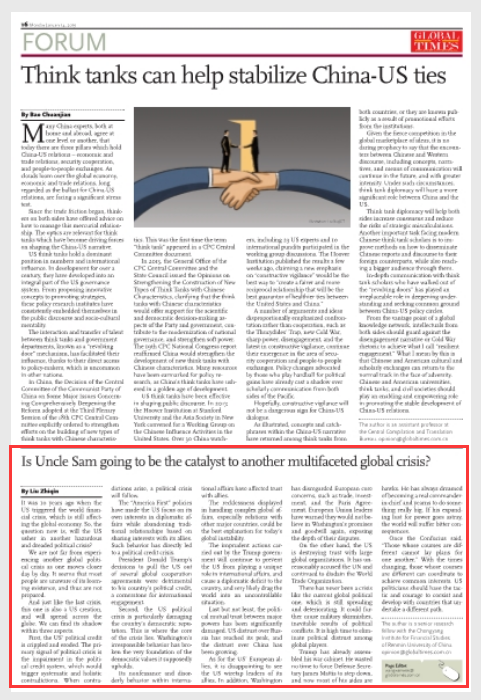Major Power Relations
Your Present Location: PROGRAMS> Major Power RelationsLiu Zhiqin: Is Uncle Sam going to be the catalyst to another multifaceted global crisis?
By Liu Zhiqin Source: Global Times Published: 2019-01-13
It was 10 years ago when the US triggered the world financial crisis, which is still affecting the global economy. So, the question now is, will the US usher in another hazardous and dreaded political crisis?

We are not far from experiencing another global political crisis as one moves closer day by day. It seems that most people are unaware of its looming existence, and thus are not prepared.
And just like the last crisis, this one is also a US creation, and will spread across the globe. We can find its shadow within three aspects.
First, the US' political credit is crippled and eroded. The primary signal of political crisis is the impairment in the political credit system, which would trigger systematic and holistic contradictions. When contradictions arise, a political crisis will follow.
The "America First" policies have made the US focus on its own interests in diplomatic affairs while abandoning traditional relationships based on sharing interests with its allies. Such behavior has directly led to a political credit crisis.
President Donald Trump's decisions to pull the US out of several global cooperation agreements were detrimental to his country's political credit, a cornerstone for international engagement.
Second, the US political crisis is particularly damaging the country's democratic reputation. This is where the core of the crisis lies. Washington's irresponsible behavior has broken the very foundation of the democratic values it supposedly upholds.
Its nonfeasance and disorderly behavior within international affairs have affected trust with allies.
The recklessness displayed in handling complex global affairs, especially relations with other major countries, could be the best explanation for today's global instability.
The imprudent actions carried out by the Trump government will continue to prevent the US from playing a unique role in international affairs, and cause a diplomatic deficit to the country, and very likely drag the world into an uncontrollable situation.
Last but not least, the political mutual trust between major powers has been significantly damaged. US distrust over Russia has reached its peak, and the distrust over China has been growing.
As for the US' European allies, it is disappointing to see the US wiretap leaders of its allies. In addition, Washington has disregarded European core concerns, such as trade, investment, and the Paris Agreement. European Union leaders have warned they would not believe in Washington's promises and goodwill again, exposing the depth of their disputes.
On the other hand, the US is destroying trust with large global organizations. It has unreasonably accused the UN and continued to disdain the World Trade Organization.
There has never been a crisis like the current global political one, which is still spreading and deteriorating. It could further cause military skirmishes, inevitable results of political conflicts. It is high time to eliminate political distrust among global players.
Trump has already assembled his war cabinet. He wasted no time to force Defense Secretary James Mattis to step down, and now most of his aides are hawks. He has always dreamed of becoming a real commander-in-chief and yearns to do something really big. If his expanding lust for power goes astray, the world will suffer bitter consequences.
Once the Confucius said, "Those whose courses are different cannot lay plans for one another." With the times changing, those whose courses are different can coordinate to achieve common interests. US politicians should have the tactic and courage to coexist and develop with countries that undertake a different path.
Liu Zhiqin is a senior fellow of Chongyang Institute for Financial Studies at Renmin University of China.























































































 京公网安备 11010802037854号
京公网安备 11010802037854号





